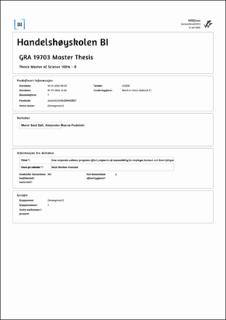| dc.description.abstract | The question of responsibility for employee mental health has been discussed in terms of corporate wellness programs. Still, there is a lack of research on perceptions of responsibility for those struggling with Zoom fatigue. Therefore, this thesis investigates how corporate wellness programs affect judgments of responsibility for employee burnout and Zoom fatigue. Two experiments were conducted with a total of 8 hypotheses based on established research and theory. Experiment 1 aimed at investigating how the mere availability of a corporate wellness program affects perceptions of responsibility for employee mental health issues. The result of this experiment showed that the theorized skew of judgment of responsibility from the employer to the employee is less than first anticipated. However, they also indicate that this shift in responsibility is conditional on the belief in the efficacy of the corporate wellness program. The more people believe in a program, the more they tend to place responsibility on the employer. If one thinks that corporate wellness programs work and are available to employees, more responsibility will be given to the individual themselves. But if one believes that they do not work, one concurrently does not believe that the responsibility lies with the individual. Consequently, if an employer chooses not to offer a wellness program and the employees believe in the program, the responsibility is set lower on individuals and higher towards the employer. Thus, it can be said that the presence of a wellness program changes the perception of responsibility; however, it depends on whether you believe that such a program would be effective. Experiment 2 investigated how employees’ uptake of corporate wellness offerings affect the perception of responsibility for poor staff mental health. As with experiment 1, the results showed that the theorized skew of judgment of responsibility upon the employer and the employees is less than first anticipated. People’s perception of responsibility does not seem to be affected at all by employee uptake of the corporate wellness offering. Thus, the employer and employees were given about the average responsibility for the employees’ mental health issues. Through the results of both experiments, we found that (1) the theorized shift in perceived responsibility was less than first anticipated, (2) the skew in responsibility seemed to be conditioned by the belief in the efficacy of the corporate wellness program, and (3) employees’ uptake of corporate wellness programs did not seem to affect perceptions of responsibility in any way. | en_US |
